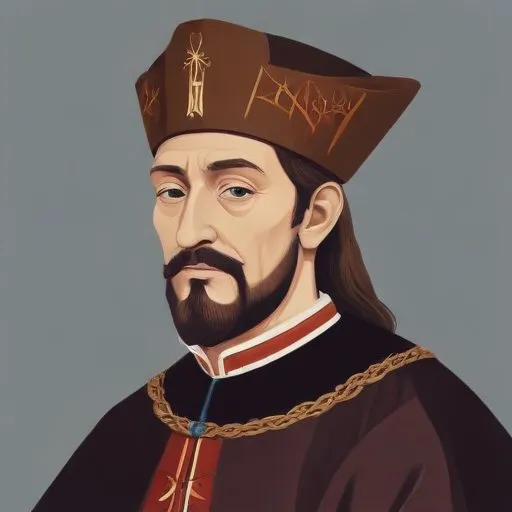
A 15th-century Hungarian king who ruled with wisdom and military prowess, known for his efforts to unify the country and defend it against the Ottoman Empire.
John Corvinus, also known as Hungarian Corvin Jnos, Croatian Ivani Korvin, or Romanian Ioan Corvin, was the illegitimate son of Matthias Corvinus, the King of Hungary, and his mistress, Barbara Edelpck. Born on April 2, 1473, Corvinus was catapulted to prominence when his father declared him his successor, showering him with honors and riches, making him the wealthiest magnate in the land.
Corvinus took his name from the raven (corvus in Latin) featured in his father's escutcheon. Initially, Matthias intended for Corvinus to pursue a life in the Church, but later changed his mind, deciding to make him his successor on the throne instead. This sudden change in plans led to Corvinus being loaded with honors and riches, creating vast apanages in Silesia, and being declared a prince.
Corvinus's father, Matthias, publicly declared him his successor, went as far as to arrange a marriage for him with Bianca Maria Sforza of Milan, and even sought recognition of Corvinus as Prince Royal of Hungary from Holy Roman Emperor Frederick III. However, Matthias's sudden death left Corvinus alone and vulnerable, surrounded by enemies.
After Matthias's death, Corvinus became a victim of chicanery, formally resigning his claims to the throne in exchange for the crown of Bosnia. He was then persuaded to retreat with the royal treasures, only to be pursued by an army that scattered his forces in the Battle of Bonefield on July 4, 1490, near Klesd in Tolna county, and robbed him of everything.
Despite his tumultuous life, Corvinus's legacy as the illegitimate son of King Matthias Corvinus continues to fascinate historians and scholars. His story serves as a testament to the intrigue and politics of medieval Europe, highlighting the complexities of royal succession and the fleeting nature of power.
Corvinus's life was marked by the complexities of royal politics, and his own beliefs and philosophical contributions remain largely unknown. However, his story highlights the importance of understanding the machinations of power and the consequences of blind ambition.

Born in 1443
Renaissance-era king who ruled Hungary and Croatia, known for his military campaigns, cultural achievements, and patronage of arts and education. He transformed his kingdom into a major power in Central Europe.
Born in 1262
King of Hungary and Croatia from 1272 to 1290, known for his tumultuous reign marked by power struggles, wars, and a decline in royal authority.
Born in 1427
Unified the Kingdom of Poland and the Grand Duchy of Lithuania, creating a powerful state that lasted for centuries. He's also known for his military campaigns and territorial expansions.